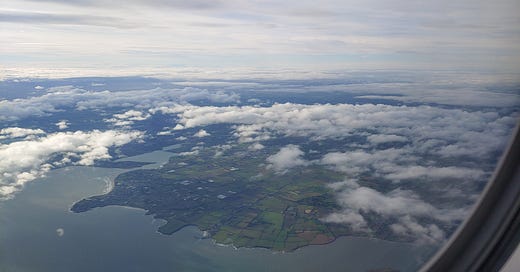One look at the president elect and his boot-licking minions, political allies and cabinet appointees and you can be absolutely certain what money doesn't buy: Joy. Peace. Sincere interpersonal connection. Kindness. Open mindedness. You can see the tension, anguish, and venom in the bodies and faces of these greed-focused humans, and I imagine it is profound suffering. I further imagine that it is why they enact profound suffering on others. They may have jets, mansions, portfolios, and golf courses, but they do not have happiness.
They got There, and there was no there There.
But money certainly does buys something and - despite the fact that it is a completely made up concept - its lack can cause real, severe, systemic, life-impacting problems. As someone who has a comfortable amount of it, especially in comparison to the broader world population, I think a lot about what it does buy, and what I do with it.
It does not buy happiness, it buys time and space.
How you occupy time and space in the precise moments you are in them, is, I believe, what may or may not afford happiness. The crux is, often those who can buy time, do so and then fill it with other ways to make themselves miserable, re-entrenching their own illusion that there is none of it. Or, they become so obsessed with having money, they build fear structures for themselves that suggest there will never be enough of it, and thereby create ways to burn time through money’s endless pursuit.
You can say the same of space: people purchase space for themselves (literally and metaphorically) and instead of being present in the openness, they fill it with items and distractions - amortizing trinkets of planned obsolescence, upsold possessions inflated with status semiotics - literally buying a lie they've sold themselves.
I was a personal assistant for multiple, exceptionally wealthy clients for 15+ years. I can tell you with certainty: very few of them are happy. Very few of them sat quietly and presently in their time and space. Similarly, when I save my pennies and travel comfortably, I have looked around at the people traveling in the same manner and so few of them seem happy. They snap at people serving them, they make little eye contact but plenty of demands. So few of them are being present with the time and space they've purchased, they glue themselves so rigorously to their phones and computers, they miss the miracles around them.
Early yesterday morning as I looked around my hotel room getting ready to leave Ireland, I thought about how many of the souls currently running from Netanyahu's, or Putin's, or [Fill-In-Broken-Man-Here]'s violent onslaught, might comfortably fit into that large space that was temporarily designated for a petite 5'2" person. I don't know why me and not them, but I damn well better appreciate the time and space I had to quietly write in a journal in an uncluttered, dry, warm room.
The pithy saying goes, want what you have. The lesson I've garnered from working for wealthy folks and being surrounded by those who have bought time and space along with me, is that the happiest people are the ones who never lose a sense of awe and appreciation for what they have.
This week, what I had was 5 days dedicated solely to chatting. My project was to talk mostly to students from Maynooth University, who identify as "mixed" in any way - grew up in mixed race households, mixed religion, mixed language, neurodiverse households, adoption households. We talked about our relationships to media, our experiences with "fitting in" and our superpowers - natural skillsets that may or may not have had challenging origin stories.
These interviews will eventually be synthesized into a podcast - a whole other set of labor activities - but for the time being, I very much want what I have: the job of interviewing. I was touched by how many of the students I met emailed me subsequently to say our talks got them thinking more consciously about their identity experiences, and that they felt warmth and comfort in talking to me. How could I want anything else in the world?
I am getting curious not only about what content interviews build, but what is the value of being interviewed in the first place. What happens when you shine the light of human curiosity on another person? Where is it invigorating and where is it draining (friends of mine who have to do press junkets regularly might say it’s more the latter)? Can interviewing be considered a creative practice? How might it be used in innovative ways, outside of journalism and content creation? How may it be taught from a nontraditional lens?
And is it a practice of time and space? I think perhaps when you interview someone well - when you both leave feeling good about the experience - the thing you have offered your subject is time and space. The space may not be literal in the sense of size - recording studios are, by design, rather contained - but metaphorically you have said, “here is a chair, here is a microphone, here is space I would like you to have. And here is my time.” The gift of codified attention that defines an interview can then, perhaps, be considered the organization and dedication of space and time.
I'm writing in draft - I haven't quite formulated these thoughts. But I am leaving this week with the vague sense that there is a meta-investigation happening in addition to my project development. There is more to be explored about how I may use my artistic practices to offer time and space… and how damn much I want what I have.






I love your words : They got There, and there was no there There.